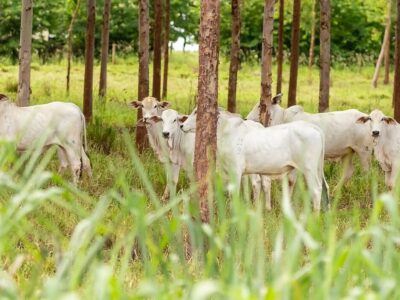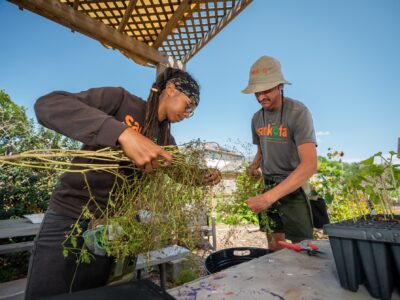The COVID-19 pandemic had a huge impact on the world’s food supply, and that impact can still be felt four years later. According to the National Institutes of Health, the “pandemic caused major disruptions to the agri-food supply chain, exposing acute structural vulnerabilities” involving everything from labor and farm production to food services. In the wake of COVID, a veteran farmer founded the Center for Agricultural Resilience (CFAR) to provide educational and other resources to bolster food security.
Photo Courtesy Center for Agricultural Resilience
CFAR is a 501c3 nonprofit headquartered at White Oak Pastures in Bluffton, Georgia. According to its website, the organization aims to educate individuals and organizations “on the environmental, economic and social benefits of building resilient animal, plant and human ecosystems.”
Will Harris, a fourth-generation cattleman who works the land his great-grandfather settled in 1866, founded the organization in 2021.
Born and raised at White Oak Pastures, Harris left only long enough to attend the University of Georgia’s School of Agriculture during the 1970s, where he was trained in industrial farming methods popular at the time. Those methods later fell out of favor, leading Harris to adopt practices that are better for the environment, animals, and food supply.
Photo Courtesy Center for Agricultural Resilience
He and others were reminded of the fragility of the food supply during the COVID-19 pandemic, when the “cracks in the food system became more and more painfully obvious,” according to the CFAR. Small farmers weren’t the only people who noticed food production bottlenecks — the bottlenecks also caught the attention of purchasing agents, consumers, corporations, and “everyone in between.”
A lack of food availability brought attention to other unintended consequences of what CFAR refers to as the “industrialized, commoditized, centralized food production system.” One of the center’s main missions is to help agricultural and business leaders rethink farming and its impact on different ecosystems. To that end, it offers training sessions for those who want to learn more.
Photo Courtesy Center for Agricultural Resilience
One of those sessions, “Fundamentals of Agricultural Resilience,” is an intensive, two-and-a-half-day program that delves into topics such as holistic agricultural/business processes and the intricacies of soil health. Participants will take part in discussions that aim to bring new knowledge to agricultural practices while also “debunking myths related to food production.” They will also get hands-on experience in land monitoring and related activities.
Other session topics include the following:
- Resiliency vs. Efficiency: Striking the Balance
- Rejuvenating the Natural Cycles: A Key to Sustainability
- Can Regenerative Agriculture Nourish the World?
- Ecological Outcome Verification: Monitoring Land Health
- Breaking Down Siloed Agriculture: Restoring Synergy
- Informed Decision-Making Through Data
Although the pandemic inspired the creation of CFAR, Harris himself began to evolve as a farmer decades ago.
As noted on the CFAR website, Harris graduated from college in 1976. When he returned to Bluffton, he and his father continued to raise cattle using their previous methods — pesticides, herbicides, hormones, and antibiotics. They also fed their animals a “high-carbohydrate diet” of corn and soy.

Photo Courtesy Center for Agricultural Resilience
While these methods “did a fantastic job of taking the cost out of the system,” Harris became disenchanted with some of the excesses of industrialized farming. In 1995, he returned to the “farming methods his great-grandfather had used” 130 years before.
In addition to Harris, CFAR’s leadership team includes Taylor Gosman, president, board of directors. He brings experience in finance, technology, renewable energy, and regenerative agriculture.
Dr. Carly L. Redding, executive director, is an associate professor and Department Coordinator for the Department of Sociology and Human Services at the University of North Georgia. Kelly Claudon, a former administrator and pastor, is CFAR’s assistant director. The organization also has four other board members with expertise in various fields.





